Keloid Treatment in Mumbai
Skin imperfections can affect a person’s confidence and self-esteem. They often cause emotional distress, making social interactions challenging. Keloids are a common type of skin imperfection. They form when there’s too much collagen produced at a healed skin injury site. Dr. Anju Methil, a trusted dermatologist in Andheri, Mumbai, explains:
“Keloids are raised scars extending beyond the original injury site. They occur when the skin’s healing process goes into overdrive, producing excess collagen. Keloids can often be itchy, painful, and aesthetically distressing. However, individuals do not have to live with uncomfortable keloids anymore. Keloid treatments offer advanced and effective solutions to manage and reduce keloid scars.”
Dr. Methil founded the Skin and Shape Clinic to help individuals overcome skin challenges. She is a trusted name for keloid treatment in Mumbai, along with her skill in managing various skin conditions.
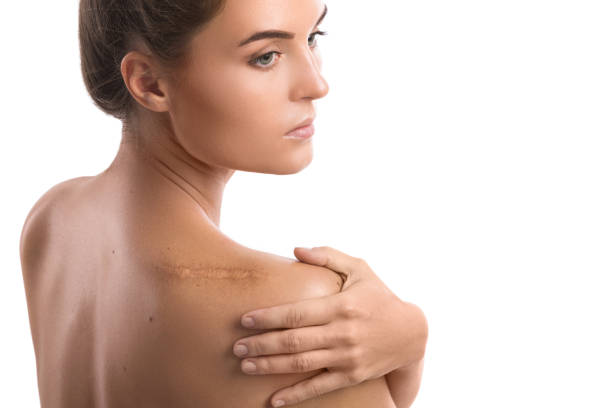
Identifying keloids involves recognizing distinct symptoms that differentiate them from other scars.
Symptoms of Keloids
- Keloids are enlarged, overgrown scars that spread beyond the boundaries of the original wound.
- The surface of a keloid is typically smooth and shiny.
- Keloids can range from pink to red to dark brown, often becoming darker over time.
- They can vary in size and may continue to grow slowly over months or even years.
- Keloids often cause itching, tenderness, or discomfort.
- They feel firm or rubbery to the touch.
- Keloids typically do not have hair growing on their surface.
- The affected area may be sensitive to touch or friction, causing a stingy feeling.
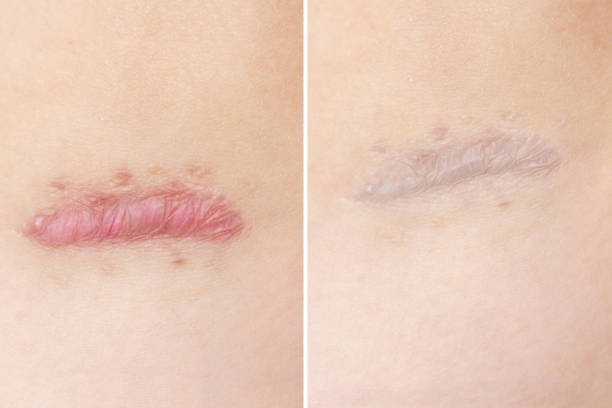
Understanding the causes of keloids is essential for preventing and effectively treating these persistent scars.
Causes of Keloids
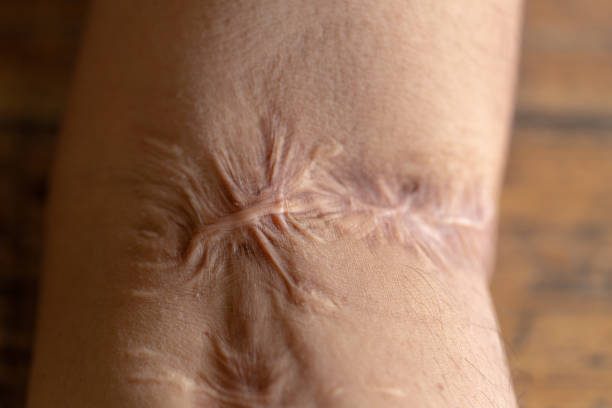
Keloids commonly form at the site of skin injuries such as cuts, burns, surgical incisions, or piercings.
- Inflammation like acne scars or chickenpox scars can also develop into keloids.
- Individuals with a genetic predisposition (family history) of keloids are more likely to develop them.
- People with darker skin tones (African, Asian, and Hispanic) are at higher risk.
- Hormonal changes increase the likelihood of keloid formation in younger individuals, especially during puberty or pregnancy.
- Keloids are more likely to develop on regions vulnerable to tension, movement, and injury, such as the chest, shoulders, earlobes, and cheeks.
- Overproduction of collagen during the healing process leads to keloid formation.
- Poorly managed wounds or infections can increase the likelihood of keloid development.
Understanding these symptoms and causes can help in the early identification and management of keloids. If you suspect you have a keloid, please consult a dermatologist for proper diagnosis and treatment.
Ready for your stunning transformation? Explore our skin pigmentation treatment in Mumbai.
If keloids are affecting your confidence and comfort, you’re not alone. These stubborn scars can be challenging to manage. But don’t worry – there are effective solutions available.
Treatment Options for Keloid
Dr. Methil, a keloid removal specialist in Mumbai, offers several effective treatment options for keloids. Each method aims to reduce their size, discomfort, and appearance.
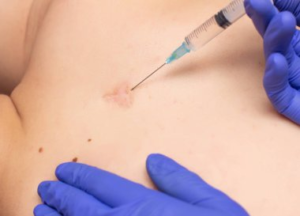
Corticosteroid Injections
Corticosteroid injections reduce inflammation and flatten the keloid over time. Patients receive injections every few weeks and often see noticeable improvements after a few sessions.
Microneedling
Microneedling involves the use of tiny needles to create controlled micro-injuries in the skin. It helps stimulate collagen production and reduce the appearance of scars, including keloids.
Cryotherapy
Cryotherapy involves freezing the keloid with liquid nitrogen to reduce the size of smaller keloids. It can be particularly effective when combined with other treatments. Patients may experience mild discomfort during the procedure, but it is generally well-tolerated.
Surgical Removal
Surgical removal is an option for larger keloids that do not respond to other treatments. The dermatologist may combine surgery with corticosteroid injections or radiation therapy to prevent recurrence. Post-surgical care is crucial to ensure proper healing.
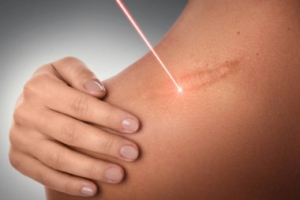
Laser Therapy
Advanced laser technology targets the keloid with focused light energy to reduce redness and flatten the keloid. This non-invasive keloid scar removal option requires multiple sessions for optimal results.
Silicone Sheets and Gels
Doctors often complement silicone sheets and gels with other treatments. They are applied directly to the keloid to help flatten the scar and reduce its appearance over time. Silicone sheets and gels are easy to use and wear throughout the day.
Pressure Therapy
Pressure therapy involves applying pressure garments or dressings to the keloid. This method is beneficial for keloids on the earlobes or after surgical removal.
Radiation Therapy
Radiation therapy is sometimes used after surgical removal to prevent the keloid from returning. Low-dose radiation targets the keloid cells, inhibiting their growth.
Each keloid treatment plan is personalized to meet the patient’s unique needs. Dr. Anju Methil, a well-known keloid specialist in Mumbai, combines her expertise with advanced techniques to provide the best possible outcomes.
Why Choose Dr. Anju Methil for Keloid Treatment in Mumbai?
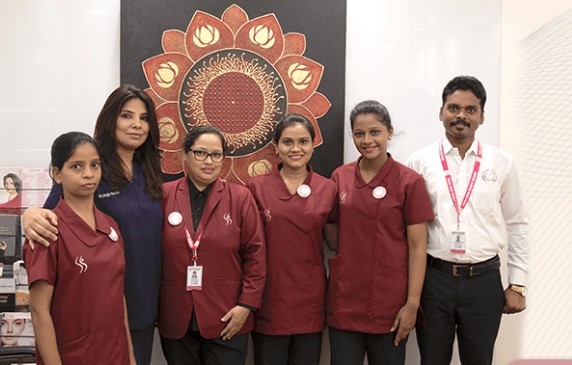
Extensive Expertise in Dermatology
Dr. Anju Methil is a highly qualified dermatologist with a comprehensive medical background. She has the necessary knowledge to handle complex skin conditions, including keloids.
Specialized Training
She has received personalized training from world-renowned dermatologists and plastic surgeons. This global exposure to advanced techniques and treatments allows her to provide cutting-edge solutions for keloid management.
Experience in Cosmetic Medicine
Dr. Methil is skilled in non-surgical treatments that can effectively minimize the appearance of keloids. Her ability to combine medical and aesthetic approaches ensures optimal results.
Reputation and Recognition
Prestigious magazines like Femina and Vogue have featured the doctor’s work. Her recognition by the Aesthetic Medicine Top 50 Dermatologists and multiple awards underscore her excellence and dedication to patient care.
Advanced Treatment Options
Skin and Shape Clinic offers a variety of advanced keloid treatments tailored to individual needs. These include corticosteroid injections, laser therapy, and silicone gel sheets, ensuring comprehensive care.
Patient-Centered Approach
Dr. Methil and her team prioritize patient comfort and satisfaction. They take the time to understand each patient’s concerns and develop personalized treatment plans.
State-of-the-Art Facilities
The Skin and Shape Clinic is equipped with the latest technology and world-class facilities. The clinic’s modern infrastructure enhances the overall patient experience.
Educational Commitment
She conducts training sessions for dermatologists and surgeons worldwide. Her commitment to education ensures she remains updated with the latest advancements in dermatology.
Trusted Consultant
As an AMI trainer and consultant for leading brands like Nykaa and Bioderma, Dr. Methil’s expertise is widely recognized and trusted within the industry.
Take the first step towards smoother, healthier skin. Consult Dr. Anju Methil for an effective keloid treatment in Mumbai. Experience dermatological care that prioritizes your well-being!
Explore answers to common questions and gain valuable insights into managing this condition. Let’s demystify keloids together – head to our FAQ section now!
Frequently Asked Questions
If you have a raised scar that is growing beyond the original wound site, it could be a keloid. It’s essential to consult with a dermatologist as soon as possible. Early diagnosis and treatment can prevent the keloid from becoming more extensive and uncomfortable.
Yes, it’s normal for keloids to be itchy and sometimes painful. Your dermatologist may recommend:
- Topical treatments like corticosteroid creams or antihistamines to reduce itching
- Corticosteroid injections to ease pain and inflammation
Keloids can recur due to the nature of the skin’s healing process in susceptible individuals. To reduce the risk of recurrence, your dermatologist might combine surgery with other treatments like:
- Corticosteroid injections
- Radiation therapy
- Pressure dressings post-surgery
Specific lifestyle changes can help prevent keloid formation, especially if you are prone to them. These include:
- Avoid unnecessary skin trauma, including piercings and tattoos
- Practice proper wound care by keeping injuries clean and covered
- Applying silicone sheets or gels can help flatten scars
- Using sunscreen on healing wounds can prevent darkening and help reduce keloid formation.
Discuss preventive strategies with your dermatologist for personalized recommendations.
There are several cosmetic treatments available to improve the appearance of keloids. They include:
- Laser therapy can help reduce redness and flatten the keloid
- Microneedling combined with topical treatments can improve skin texture
- Cryotherapy is another option to shrink keloids
Your dermatologist can recommend the best cosmetic treatments to enhance confidence and comfort.

